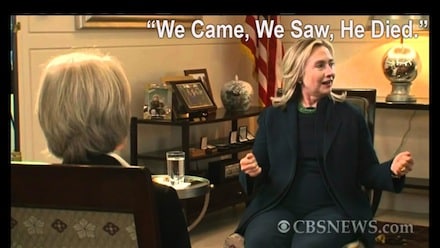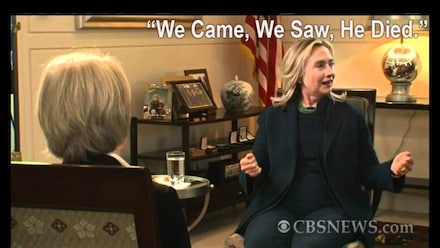
Libya is the perfect storm example of the failure of US interventionist policy in the Middle East.
The Obama-Clinton Model
In 2011, Libya was to be the centerpiece of Middle East Intervention 2.0, the Obama-Clinton version.
Unlike the Bush model, that of Texas-sized land armies, multi-year campaigns, and expensive reconstruction efforts, the Obama-Clinton version would use American air power above, special forces and CIA on the ground, and coordinate local “freedom fighters” to overthrow the evil dictator/terrorist/super-villain of the moment. “We Came, We Saw, He Died,” cackled then-Secretary of State Clinton as Libyan leader Moamar Quaddafi was sodomized by rebels on TV.
The idea was that the US would dip in, unleash hell, and dip out, leaving it to the local folks to create a new government from scratch. So how’d that strategy work out in Libya?
Benghazi Only A Sign
Benghazi was only a sign of the chaos to come.
Here’s the state of Libya today. Several Islamist groups vying for control in Libya have pledged allegiance to the Islamic State and carried out barbaric executions, as in Iraq and Syria. The growth and radicalization of Islamist groups raise the possibility that large parts of Libya could become a satellite of the Islamic State where one never previously existed.
Libya’s official government, led by Prime Minister Abdullah al-Thinni, has only tenuous authority, having been run out of Tripoli last summer amid fighting between rival militias formed during the 2011 civil war.
The shell government Thinni leads, pathetically still recognized by the international community, operates out of the eastern city of Bayda. The Libya Dawn movement, a coalition of militias and political factions, has wrested control of the capital and established a rival government.
Fighters who identify themselves as part of the Islamic State have killed journalists and many other civilians. They took credit for the November 13 bombings targeting the Egyptian and United Arab Emirates embassies in Tripoli. Last month, fighters linked to the Islamic State kidnapped Egyptian Coptic Christians and bombed the Corinthia Hotel in the capital, killing ten people.
And according to the New York Times, the chaos in Libya has paralyzed the economy. The one industry that is booming is human smuggling. Taking advantage of the lawlessness, smugglers who use Libya as a way station in moving impoverished sub-Saharan Africans and Syrian refugees to Europe have become increasingly brazen and reckless in their tactics, sending hundreds to their deaths.
Egypt Bombs Libya after 21 Beheaded
In what is only the latest evidence of the failure of the 2011 intervention, Egyptian jets bombed Islamic State targets in Libya recently, a day after the group there released a video showing the beheading of 21 Egyptian Christians. That forced Cairo directly into the conflict across its border. While Cairo is believed to have provided clandestine support to some former-Libyan general fighting the rogue government in Tripoli with his own militia, the mass killings pushed Egyptian President Abdel Fattah al-Sisi into open action.
The Obama-Clinton Model
While Libya is the perfect storm example of what happens when the US clumsily intervenes in a Middle Eastern country, it is certainly not the only example. The evacuation of the American embassy in Yemen is the marker for America’s policy failure there. The US is again at war in Iraq, trying the new interventionist model as a recipe to rescue the old one. That conflict alone threatens to inflame the entire region, pulling in Jordan, Turkey, Iran, Saudi Arabia, the UAE and others.
Want to see the future? Look to the recent past. Look at Libya.
Reprinted with permission from We Meant Well.

